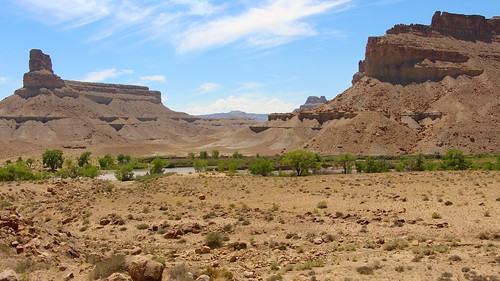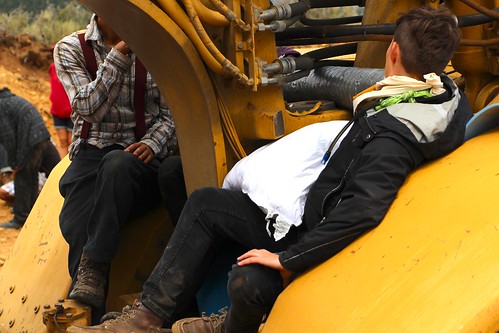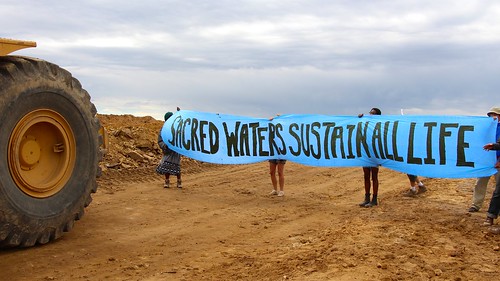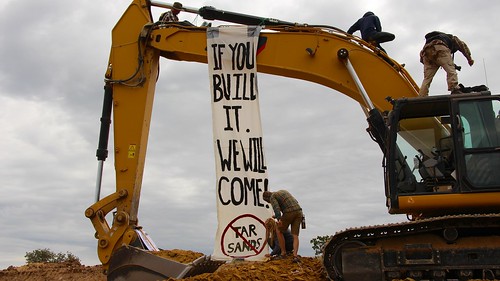Utah Canyon Country Action Camp
by @UneditedCamera
(this piece was cross-posted with permission from Unedited Media)
The action camp call was simple, a camp to come and learn the skills in nonviolent direct action(NVDA) to shut down the first tar sands mine in the United States. The camp did as it set out to do. The action stopped all work on the mine site . It was so successful that US Oil Sands, the company pushing to develop the mining site, reported a 13% loss of their stock price on the day of the action. People laid their bodies in front of the machinery to prevent them from carving out the Earth. The action itself was the culmination of trainings performed at the action camp that went above and beyond blockade trainings.
The buildup started at the Utah Canyon Country Action Camp. The nearest town to the camp (pop 863) was famous for its melons, Green River’s esteem for these melons is so high that the town holds an annual event to celebrate them. The camp was stationed at a desert cut open by the Green River. The terrain of sand, heat, and rock formations is so breathtaking that every local mentioned it to us.
The organizers’ call to action was under the banner of climate justice, a space where environmentalism and social justice meet. The action may have peaked that Monday July 29th, but it began its building wave towards the blockades at the first day of camp. Each morning we gathered, the rising sun yet to crest the plateau, in a circle where the camp would acknowledge the schedule of trainings and work being put forth to stop the mines, and also acknowledged the bringing together so many whose lives had traveled so many directions to be there. Each day opened with a different speaker, whose views on the meaning of the world around us were strange and foreign to me. One morning a speaker asked us to look at the rocks all around us, the plateaus and look at them as bearers of memories who see us right now, and see us for why we had come there. Our brief week somehow being marked in history of the rocks rising around us.
We had spent a week together; sharing food, and swimming in the green river whose waters kept everyone alive, and safe, from Utah’s constant one hundred degree heat. The people who gathered along the Green River that week arrived at different points in their own lives. They shared that space, and the camp’s organizers acknowledged the need for the people gathered to understand their difference, and to be able to view the multiple walks of life present. All these lives ran divergent directions, were speckled by specific experiences, but in this week intersected in the Utah Desert.
We listened to stories from front line communities who are experiencing climate change first hand. They spoke of the direct consequences of these extractions processes, lists of dead family members, cancers rising, water ways and ancestral lands threatened by pollution or already polluted. Communities under barrage, from extraction companies, but also those pushed up against refineries who’ve polluted the air until it lays still and brown over their homes.
We were told that this fight for people’s homes, homelands, and communities, wasn’t recent, it went back half a millennium, from the first step of a colonist, to the first lost lands in memory. It went back to the poisoning of watersheds and commoditization of life, where extractions companies and corporations stopped seeing that the numbers they pushed around to maximize profit were really people’s lives. Now people had come together to push back.
The people who’d come to learn skills and partake in those circles were as different as difference allows. I met someone from California straight out of any beach magazine, blue eyes and sun bleached short hair. He was interested, he said, interested in how else he could resist what he saw happening. He said he wanted to explore other options to approach the general degradation of land. I also met an eleven year old who taught a workshop on anti-authoritarian art and played us songs from his punk band and tried to raise money to help buy a building for a community center back home.
There were mothers and fathers, there was a white haired woman whose life experience I cannot begin to fathom, but who would later thank us for not telling her she couldn’t do something because of her age. Trans folks and queer folk, the impoverished and undocumented. People from many walks of life were in this camp, and had to learn to live and work together. The organizers of the camp filled the spaces between workshops on NVDA; workshops on, media, and banner making, and opened spaces between them where the people who came to this place, to join this fight, could share with each other the stories of their homelands.
The stories of each other lives shared in caucus after caucus: people of color, student caucus, queer caucus, male allies, women’s caucus, white allies and on and on. Between the trainings we spent time sharing our experiences in spaces that were safe to share those experiences. There were tears and misunderstandings, lines of communication broke down as the heat and days pulled at us. In the end, I witnessed nearly one hundred people sit silently for over two hours and listen to different representatives from front line communities share the stories they carried with them to this place.
That day, we sat and listened, as only we could listen, after days of heat and conversations about difference, about our struggles, and acknowledge that we can’t know each other’s lives, but that we can be willing to be here for them and listen as they tell it. These stories settled in the listeners, who never interrupted. The camp listened as dead loved ones were invoked in quiet tear-filled voices, stories of a mining vehicle shattering a loved one’s life, racism scaring children. Stories of systemic oppression brought to life, polluted waterways and shrinking and stolen homelands and everyone sat still that day and bore witness, and listened as a man broke down crying that his community has been torn apart for centuries and that he’s thankful that so many came to stand next to him.
On that Monday in Utah, over a hundred people came to the US Oil Sands mine and shut it down. They fought for those in Utah who invited them, but they also knew that they shut them down for the communities in Alberta where tar sands mining has killed and destroyed families. It stopped these mines for the all the indigenous folks who shared their stories, who have been lied to by every government agency ever created. They stopped those mines for the communities who are experiencing climate change now, whose homelands sink under the ocean. They shut them down because the hope that they felt through each other reverberate on that plateau.
Those hundred people said, “No more.” No more environmental destruction, no more climate racism, no to lies, no to letting our only planet die. Together a step was taken to fight back and shut down those mines in the name of Climate Justice, in the name of a future we are all going to write. In the future where I hope to meet you one day.
@uneditedcamera
Video of action:
@Uneditedmedia is a grassroots collective of trainers, organizers, artists and dreamers fueled by your generous donations.
Contact them: UneditedMedia@gmail.com
www.uneditedmedia.com





Leave a Reply